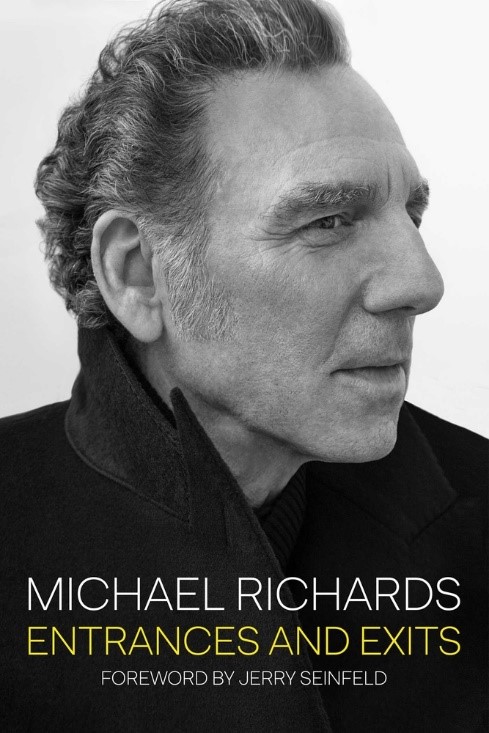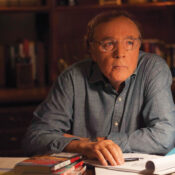It could serve as something of a cultural Rorschach test for readers to discover which chapters in Michael Richards’ new memoir, Entrances and Exits, will hold the most immediate interest. The ones devoted to Richards being cast in Seinfeld and how he painstakingly and meticulously created his iconic character, Cosmo Kramer? What Richards has to say about working on Weird Al Yankovic’s cult favorite UHF or his experiences on the SNL-adjacent Fridays? Or the chapter “Not Funny” about the 2006 incident at the Laugh Factory that upended his life and career, when Richards launched into a tirade directed at Black audience members who interrupted his show?
Richards is a funny-bones comic actor. Though he’s best known for playing a hipster doofus, as he describes Kramer in his book, he is calm and low key in conversation about his life, from his fraught childhood to the heights of peak stardom with Seinfeld to the depths of disgrace following his career implosion. He is especially deliberate and thoughtful about that night when, as he writes about the hecklers who continually disrupted him while onstage: “They went low, I went lower.”
As he was working out new material in the unstable petri dish that is a comedy club late at night, they shouted out that they didn’t think he was funny. Instead of de-escalating the situation or making comedy out of it, Richards, in a rage, ranted the n-word at them. The incident went all kinds of viral and Richards was branded a racist.
He departed from standard career rehabilitation procedure. He did not come out with the manufactured “If I offended anybody” mea culpa. He was well aware he offended everybody. He basically cancelled himself.
He appeared on Late Night with David Letterman for a cringe-inducing interview following the incident. It was the very definition of “too soon.” His intention was to genuinely apologize and make sense of what happened.
He’s still trying. Outside of a few appearances, such as an episode of Jerry Seinfeld’s streaming series Comedians in Cars Getting Coffee, and a Seinfeld reunion story arc on Curb Your Enthusiasm, he has made good on his word to work on himself before returning in a significant way to the public eye.
Giddy Up.

Donald Liebenson: Regarding the book, I’d like to start with the striking portrait of you on the cover. I see different things in your expression each time I look at it. What does it communicate to you and why did you want to use it for the cover?
Michael Richards: Tony Duran shot the photo. Just natural light, Tony, and me. It was one of the first photos he took. I felt very present. I was in a place of musing. He knew that I had been looking back on my life, the highs and the lows. I think he captured a whole lot.
DL: You write about a fraught childhood, an absent father who your mother told you was dead even though he wasn’t, a beloved grandmother who suffered from mental illness. Comedy seemed to be an escape for you. Who were your influences?
MR: My grandmother was a paranoid schizophrenic. She took care of me for the first six years of my life until her illness got so bad she had to be committed. I didn’t come into comedy until many years later, when I was 14, not to escape, but to enter what interested me. As far as comedy influences go, I suppose I was absorbing Laurel and Hardy on TV when I was a boy. They made me laugh. Also, they felt close to home because they were. I recognized some of the backgrounds in their film shorts. They shot in and around Baldwin Hills, throughout Culver City, and the MGM studio backlot where I snuck in and played sometimes as a kid. But I never connected all this to me doing comedy someday as much as I just enjoyed their routines.
As far as me doing comedy, I have to say it’s inborn. I just had this thing where I could make my friends laugh, I couldn’t be anything else. I took a couple of my friends in fifth grade to this old abandoned farmhouse near where we lived. It was boarded up and deteriorating. I led them to believe that there was a dead body upstairs in the closet and they got scared and ran out of there. This amused me. I was good at making them believe. I think this was the actor in me.
DL: You had been on Fridays and done some work on TV and in films. Seinfeld was next level stardom. When did you realize you’d made it?
MR: I knew I made it when I got Kramer’s shoes. I found the feet to the character – how I stand, move, especially when I slid into Jerry’s apartment…I started getting applause for this. And then Jimmy Brogan, who was doing our pre-show warmups, was told to tell the audience not to applaud when I entered scenes. I don’t know who put the kibosh on me getting the applause, but that’s when I knew I really made it.
DL: Kramer was ranked among the top 50 TV characters of all time. Did you have concerns about typecasting and moving on from the role?
MR: Oh, yes. Kramer was huge. After Seinfeld, when agents were telling me it would take some work to shake off this Kramer character, I didn’t want to believe it. I always thought of myself as an actor — there are lots of parts to play, between Fridays and Seinfeld, I had been playing many different parts — heavies, comedy roles, so what’s the problem? But really, everyone saw me as the K-man and I couldn’t find any work that could be better than what I had been doing on Seinfeld.
DL: I get the impression from the book that stardom wasn’t an easy fit for you.
MR: Early in my career [manager] Charlie Joffe told me about the necessity of coming out from behind the character to let people see the real me, and that just terrified me. I didn’t know if I could do that. Being known for a character was enough. If everybody is calling me Kramer, that’s okay. That’s my job. It’s when people start calling me Michael Richards….
I used to love that part of The Red Skelton Show, where Red would come out at the end, and he’d be all sweaty and his hair mussed up and he would say thanks for watching. He would meet the audience for a moment, and you could just see the man. He seemed comfortable just being a person and also a star. The horrible event at the Laugh Factory took me into a deep study of myself for so, so many years. I had to rip off this comic mask and go the person behind all of this.
DL: As you write in the book about that night, the hecklers went low, and you went lower. We won’t rehash it. But I heard this on Ted Lasso, and I thought of you: “I hope that either all of us, or none of us, are judged not by the actions of our weakest moments, but rather, by the strength we show when, and if, we’re ever given a second chance.”
MR: That’s pretty cool. A second chance is like a wonderful grace. Maybe even better than the first shot at something. You get to improve and return with something good.
DL: Did you realize instantly the magnitude of what you had done and the impact it would have on your career?
MR: Yeah, I knew I was going to take a tumble. It’s like a surfer riding a wave knowing he’s going to wipe out but riding it anyway to see how much of it he can ride. I could be accused of being irresponsible. Yes, I was an irresponsible fool. It’s late night at a comedy club. I’m on a stage, not in the real world. So “let’s get messy and see where this goes.” Okay, bad words. Bad show. I bombed. I certainly wasn’t funny.
DL: Your Late Night appearance with David Letterman was gut-wrenching to watch. When you said, “This might not be the best forum for this,” it was clear you were sincerely trying to find your way.
MR: Yeah, I’m glad you got that. I was shattered. It’s very raw. But… adios. As I said to Letterman, I have personal work to do.
DL: When did it dawn on you it would have to be “adios?”
MR: When I saw people exploiting the situation. No one wanted to make any peace. Everybody wanted to make it worse. I realized I had to work this out within myself.
DL: You write that following the Laugh Factory incident, you received support not just from friends like Jerry, but from people such as Paula Poundstone, whom you did not know. That must have meant a lot to you.
MR: Yes, it showed empathy and care. It was touching. And I was offered club dates, but I didn’t want to go back into the clubs. I just wanted to be alone. I needed alone time, no matter how long it took.
DL: I would be afraid people would go for the purpose of trying to provoke me.
MR: Yeah, that probably would have happened. And I would have to engage it and see if I could make comedy out of it. Everybody would probably show up [to see what would happen] and a great popularity might have come out of it if I could indeed make the comeback, get the laughs, but I had something else going on inside me.
DL: You were not the first to, as you write in the book, be in the news unfavorably, but what advice would you give to those who find themselves in that situation?
MR: Own it. Lean into the wrong and figure out what’s right. It’s an opportunity to know thyself.
DL: You make a startling disclosure in the book about being diagnosed six years ago with prostate cancer. How are you?
MR: For now, I’m clear of cancer. I’m approaching 75 and I have my health. I’m enjoying promoting the book, glad I got some of my story on paper.
DL: You have been out of the public eye, as it were, for more than a decade. In writing the book and now promoting it, was there trepidation about revisiting the Laugh Factory incident?
MR: No. I ‘m always revisiting it.
This conversation has been edited for length and clarity.
Become a Saturday Evening Post member and enjoy unlimited access. Subscribe now




Comments
We all make mistakes and do stupid things, only not so publicly as Michael Richards did. The joy and enjoyment and pleasure that he gave me on “Seinfeld,” and also on his brief followup sitcom, which is mostly forgotten, far outweighs the mistake he made.
Michael doesn’t seem to know how loved he and Kramer are. My generation (75+) and my son’s generations love Kramer and Seinfeld. I hope he can and is forgiving himself for his missteps and will go on to greater things!!
Thanks DL, for this interview with Michael Richards. I hadn’t thought about him in quite awhile, and he definitely deserves the opportunity for a comeback. Looking at the ‘Entrances and Exits’ cover, I see a serious yet friendly Michael that’s owned up to (and for) his mistakes.
18 years is a long time, and we shouldn’t be judged by the actions of our weakest moments, but by the strength we show when, and if, we’re ever given a second chance as Ted Lasso stated. Michael, I think it’s time for YOUR second chance. I’d love to see what you, Jerry and Larry could cook up in that comedy kitchen. I know it’ll be wonderful.